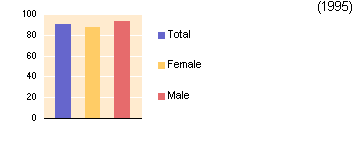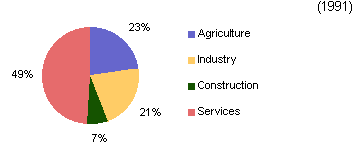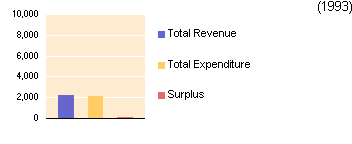|
|
|
 |
Basic Facts
Official name
Democratic Socialist
Republic of Sri Lanka
Capital
Sri Jayewardenepura
Area
65,610 square kilometers
25,332 square miles
Major cities (Population)
Colombo
616,000 (1990 estimate)
Dehiwala
196,000 (1990 estimate)
Jaffna
129,000 (1990 estimate)
Sri Jayewardenepura
109,000 (1990 estimate)
Kandy
104,000 (1990 estimate)
Galle
84,000 (1990 estimate)
|
|
|
People
|
|
|
Population
18.4 million (1995)
Population: Regional Comparison
(in thousands)

Region
South Asia
Population growth rate
1.3 percent (1990-1995)
Population density
280 persons per square
kilometer
725.2 persons per square
mile (1995)
Percent urban
22.4 percent (1995)
Percent rural
77.6 percent (1995)
Life expectancy, female
74 years (1995)
Life expectancy, male
70 years (1995)
Infant mortality rate
28 deaths per 1,000 live
births (1990)
Literacy rates
Total
90 percent (1995
estimate)
Female
87 percent (1995
estimate)
Male
93 percent (1995
estimate)
Literacy
(in percent)

Ethnic divisions
Sinhalese
74%
Tamil
18%
Moor
7%
Burgher, Malay,
and Vedda
1%
Languages
Sinhala
74%
Tamil
18%
English
10%
Religions
Theravada Buddhist
69%
Hindu
15%
Christian
8%
Muslim
8%
|
|
|
Government
|
|
|
Government
Republic
Parties
United National Party (UNP),
Sri Lanka Freedom Party (SLFP), Sri Lanka Muslim
Congress (SLMC), All Ceylon Tamil Congress (ACTC),
People's United Front (MEP, Mahajana Eksath Peramuna),
Eelam Democratic Front, Tamil United Liberation
Front (TULF), Eelam Revolutionary Organization of
Students (EROS), New Socialist Party (NSSP, Nava
Sama Samaja Party), Lanka Socialist Party/Trotskyite
(LSSP, Lanka Sama Samaja Party), Sri Lanka People's
Party (SLMP, Sri Lanka Mahajana Party), Communist
Party, Communist Party/Beijing (CP/B), Democratic
United National Front (DUNF)
NOTE: The United
Socialist Alliance (USA) includes the NSSP, LSSP,
SLMP, CP/M, and CP/B.
Independence
4 February 1948 (from
the United Kingdom)
Constitution
31 August 1978
Voting rights
Universal at age 18
Member of
AsDB, ANRPC, ANRPC, C,
CCC, CP, FAO, G-24, G-77, IAEA, IBRD, ICAO, ICC,
ICFTU, ICRM, IFAD, IFRCS, ILO, IMF, IMO, INMARSAT,
INRO, INTELSAT, INTERPOL, IOC, IOM, ISO, ITU, NAM,
PCA, SAARC, UN, UNCTAD, UNESCO, UNIDO, UPU, WCL,
WFTU, WHO, WIPO, WMO, WToO, WTrO
Freedom rating
Partly free (4.5)
|
|
|
Economy
|
|
|
Gross domestic product (GDP)
U.S.$11.71 billion
(1994)
GDP per capita
U.S.$512 (1991)
Gross Domestic Product
(in percent)

Government expenditures
U.S.$2.1 billion (1993)
Government revenues
U.S.$2.2 billion (1993)
Government deficit/surplus
U.S.$113.8 million
(1993)
National Budget
(in million U.S.$)

Monetary unit
1 Sri Lankan rupiyala
(rupee) (SLRe) = 100 cents
Major trade partners for exports
United States, Germany,
Japan, United Kingdom, Belgium, Taiwan, Hong Kong,
China
Major trade partners for imports
Japan, Iran, United
States, India, Taiwan, Singapore, Germany, United
Kingdom
Exports
Tea, rubber, coconut
products, textiles and garments, gemstones,
petroleum products, graphite
Imports
Sugar, rice, flour,
wheat, petroleum and petroleum products, machinery
and equipment
Industries
Tea, coconuts, sugar,
cotton, cement, petroleum refining, textiles,
clothing, tobacco
Agriculture
Accounts for 23 percent
of the GDP (1991) and 39 percent of the labor force
(1993); cash crops—tea,
rubber, coconuts, copra; other crops—rice,
sugarcane, cassava, potatoes, maize, peanuts,
tobacco, beans, millet, sesame seeds, coffee, cacao;
animal products—milk,
eggs, meat, hides; not self-sufficient in rice
production.
Natural resources
Gemstones, graphite,
phosphates, iron ore, monazite, uranium, ilmenite,
limestone, clay, rutile, zirconium, salt
Sources
|
|
|